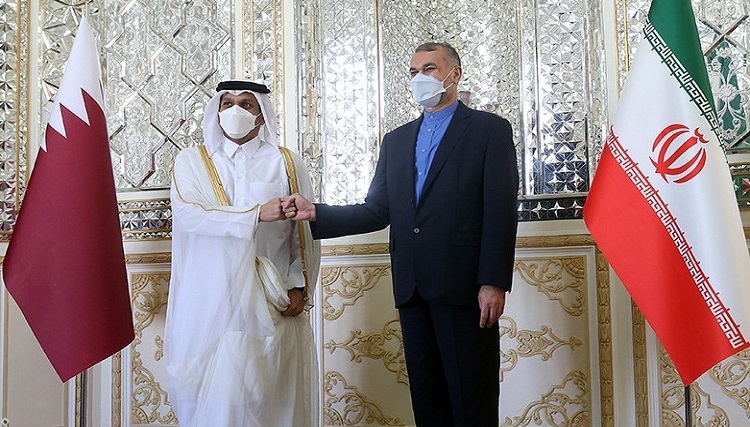Davood Ahmadzadeh in an interview with the site of Strategic Council on Foreign Relations added:” the second objective pursued by the U.S. President was the realization of security arrangements in the Middle East region which was followed earlier under Abraham Accords”.
He added:” the Accords had already been concluded during Trump with Arab countries and Biden made effort to operationalize the new security arrangements with bringing the Zionist regime to the region”.
Having referred to Biden’s visit to Saudi Arabia, Ahmadzadeh said:” in this country, there was a coordinated effort between the Zionist regime and Arab countries to confront with what is called as Iran’s regional clout, under the title Iran-phobia”. Following negotiations led by Saudi Arabia and other Arab countries including UAE, Jordan, Egypt, Iraq and Qatar, effort was made to lay the groundwork for connection of an air defense system to combat so-called Iranian drone and missile threats in the region”.
According to the expert, another objective of Biden’s visit to the region related to Russian invasion of Ukraine and disorder in exporting oil and gas to Europe and other parts of the world, as if Joe Biden tried to convince Saudi Arabia’s authorities to increase their oil production against guaranteeing Saudi Arabia’s security and turning a blind eye on human rights issues in the country such as Jamal Khashoggi’s butchering that he already announced it among his red lines, in order to encounter Russia and to exert double pressure on the country”.
The expert of the Middle East issues explained:” Despite efforts made by Joe Biden to integrate the Zionist regime into the security arrangements of the Middle East region and expansion of Arab-Hebrew cooperation in the region, it seems that the efforts have faced with serious failures”.
He emphasized:” Saudi authorities in their interview with news agencies of the region have referred to Arabic NATO coalition or the Middle East NATO as confusing terms whose creation seems to be unlikely, even they expressed their readiness to extend their friendship hand towards Tehran in order to reduce the disputes”.
Ahmadzadeh continued to mention that as one of the avant-garde of relations with the Zionist regime, UAE announced at the end of Jeddah (summit) meeting that it is ready to send its ambassador to Tehran as a gesture (of good will) for détente and sorting out the regional disputes. He said:” the UAE reaction in not in tune with regional game of Washington – Tel Aviv”.
Having stated that some (observers) have branded the new U.S. and the Zionist regime game in the region as the new political game whose success is unexpected in view of objective realities of the region, he said:” the region has is not ready to be engaged in a new clash”.
Ahmadzadeh touched upon some threats of Tel Aviv and Washington, and said:” the threats are objective realities which should not be neglected. In fact, to leave behind the present situation and to confront with the U.S. as well as the Zionist regime policies, it is necessary that headless to hues and cries of media and publicity ambiance of the U.S. and Zionist regime, Iran adopts the policy of dialog and compromise with the regional countries through official channels. The first step in such negotiations can be the continuation of talks with Riyadh, which means Baghdad talks to be continued”.
Ahmadzadeh believes that with endeavors, coordinated and integrated policies, the problems between Iran and Saudi Arabia can be sorted out, and to transfer those problems from security dossiers to political fields.
He explained:” it seems that with Iran’s support to continuity of ceasefire in Yemen and also some collaborations and contributions in other hot spots of the West Asia like Syria and Iraq, the present situation can be left behind on a step by step basis, and prepare the situation for stabilization of endogenous security without the intervention of Western countries and the Zionist regime”.
Having replied to the question of why Riyadh and some other Arab capitals find their interests in alignment with the West and the Zionist regime? he explained:” it must be brought to attention that origin of disputes between Iran and some Arab states date back to over the past 40 years ago, that means their disputes with Iran are not new ones; from one hand we witness ideological disputes between Iran and Saudi Arabia, both countries consider themselves as claimants of the world of Islam, from the other hand ethnical and identity issues continue to be visible in the disputes between Iran and some Arab countries of the Persian Gulf region. These are among diverging and conflicting issues between Iran and some Arab countries of the region”.
The expert of the Middle East issues ultimately called the modality how relations with some Western countries are tuned as one of the reasons for sustainable disputes between Iran and some Arab countries. He said:” due to its security agreements and oil export, Saudi Arabia has defined its security in convergence and close relations with the West including the U.S. while Iran believes in endogenous security and distrust to the West including the U.S. However, it is evident that organizing negotiations, explicit and sincere talks between Iran and Arab countries based on trust and common will of parties involved, will be very fruitful and influential”.
The Complexities and the Necessity of Confronting ISIS-Khorasan
Strategic Council Online – Note: With the rise of the Taliban in Afghanistan, the issue of ISIS-Khorasan, the conflict between these two groups, and the expansion of the scope of their security threats in the region have become more critical than ever before, as the terrorist activities of this terrorist group disrupt regional security. In addition to this, support for suicide activities and armed individuals in the region has also put the security of Iran at risk. Therefore, ISIS-Khorasan is recognized as a significant threat to the eastern security of our country.
Dr. Hossein Ebrahimnia – Regional Issues Expert










0 Comments